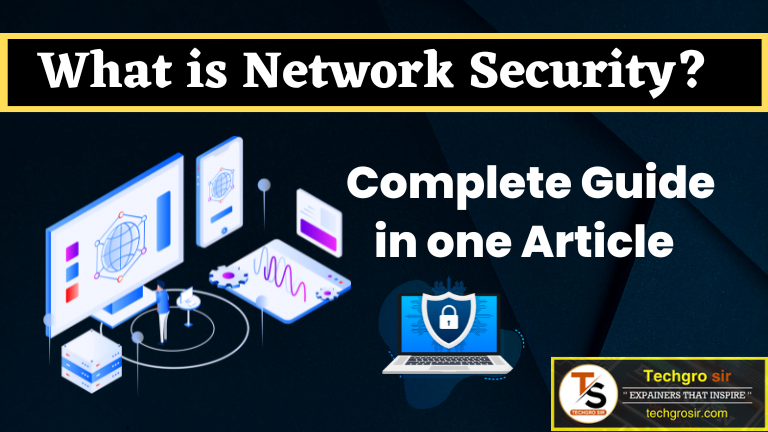In today’s hyper-connected world, where data flows like a river across networks, network security has become more crucial than ever. With the rise in cyber threats, data breaches, and malicious attacks, protecting sensitive information is no longer an option—it’s a necessity. Whether you’re an individual safeguarding personal data or a business protecting confidential client information, network security acts as the first line of defense against evolving digital threats.
But what exactly is network security? How did it evolve over the decades? What types of security measures exist, and how do they work to shield networks from vulnerabilities? 🤔
In this comprehensive guide, you’ll discover:
✅ The history of network security – from its humble beginnings in the 1970s to the advanced systems we use today.
✅ The types of network security – including firewalls, VPNs, intrusion detection systems, and more.
✅ The top network security tools that experts rely on to detect and prevent cyber threats.
✅ The principles of network security – confidentiality, authentication, integrity, and availability.
✅ The benefits of network security and why it’s essential for individuals, businesses, and governments alike.
💡 By the end of this article, you’ll have a clear understanding of how network security works, the threats it combats, and how it helps organizations stay resilient against cyberattacks. So, without any further delay, let’s dive into the world of network security and uncover its significance in today’s digital landscape!

History of Network Security?
1970s: Network security began in 1970 with the development of the ARPANET network. In 1971, the first computer virus Creeper was discovered, which spread on the network.
1980s: With the development of the Internet, it became a priority. Firewalls and antivirus software were created during this period.
1990s: After the Internet became commercial, cyber attacks started increasing. Technologies like IDS (Intrusion Detection System) and VPN (Virtual Private Network) were developed to prevent them.
Present: Today network security has become a broad field, in which new technologies are being developed rapidly to protect digital data and infrastructure.
Types of Network Security
Below we are going to give you different types of network security by which you can get more clear about it:
Access Control: It helps companies protect confidential information and networks from unauthorized users and devices. Only authorized users get network access.
Antivirus and Anti-malware Software: This software prevents harmful programs such as viruses, Trojans, worms and takes immediate action if they enter the system.
Cloud Security: This security is necessary to protect data stored in the cloud from unethical people, so that the data remains safe.
Many businesses use SaaS applications to give their employees access to data stored in the cloud. This type of protection creates a little depth in the visibility of the data.
Email Security: It protects email accounts and content from hackers. Spam filters automatically send fraudulent emails to the spam folder.
Firewalls: This is a hardware or software device that monitors network traffic and allows or blocks access according to security rules.
Application Security: Security measures are adopted in the application to protect it from data theft and hacking, which keeps it safe.
Intrusion Prevention System(IPS): It monitors network activity and detects and reports suspicious activity and tries to stop it.
Virtual Private Networks (VPNs): VPN creates a secure, encrypted connection between the device and the network over the Internet, keeping data secure.
Wireless Security: Security is important to prevent unauthorized devices and users from accessing the wireless network.
Web Security: These security measures are adopted to protect websites and cloud gateways from cyber attacks.
Data Loss Prevention: Data Loss Prevention, also known as DLP, is a technology that prevents employees from misusing confidential data. It makes them unable to send, upload, print, or forward sensitive data.
Behavioral Analytics: It helps identify potential threats by differentiating between normal and abnormal network activity.
In this blog, we will discuss several tools that network security experts use to keep networks secure.
Top Network Security Tools
Some of the security tools, hardware, and software required to make a network truly secure are listed below:
- Wireshark
- Nessus
- Aircrack
- BackTrack
- Snort
- Netcat
- Metasploit
- Cain and Abel
✅Wire Shark : Wireshark is an open-source tool that monitors and manages network traffic in real-time. It can quickly solve network problems by analyzing incoming and outgoing traffic. It works on Windows, macOS and Linux.
✅Metasploit : Metasploit is a user-friendly software that provides many security-related tools. IT experts use it to test the security of systems and implement security plans. It tests and strengthens the security of servers, networks and web apps.
✅Nessus : Nessus Professional is a security software that identifies bugs and security flaws present in systems, applications and devices. It also scans cloud apps and prevents security breaches.
✅Aircrack : Aircrack is a software that works on wireless networks. It has features like detector, WEP and packet sniffer. It runs on Linux, macOS and Windows.
✅Snort :- Snort is an open-source security tool that detects cyber threats in a network. It identifies activities such as unauthorized access and data theft.
Now we will understand the network security attacks that can put the security of a network at risk.
What is Network Security Attack ?
Cyber criminals make malicious attempts to weaken the security of the network. Strong network security is essential to protect against these attacks. It maintains the security framework, which can prevent such attacks. Only by understanding these problems can we know their solutions.
Types of Attacks in Network Security
Here is the list of some types of attacks that is common in network security:
1). Virus: Virus is a harmful file which when downloaded changes the coding of the computer. This damages the system files and also affects other computers connected to the network.
2). Malware: Malware is a deadly attack which gives unauthorized access to the system or network. It spreads rapidly through the internet and also infects other connected systems.
3). Worm: Worm enters the system without the user’s permission. The attacker sends malware from the internet through a vulnerable application, which silently downloads and infects the system.
4). Packet sniffer: This is a device which catches data packets sent over the wireless network. It may contain sensitive information. Cryptography is used to prevent this.
5). Phishing: In this attack, hackers send fake emails which appear to be from reliable sources like banks or investors. Users share sensitive information by clicking on the link.
6). Compromised key: When the attacker obtains the security key of the network, it is called a compromised key. Through this, confidential information is stolen by decrypting encrypted data.
7). Botnet: Botnet is a software that infects many computers connected to the network. The attacker secretly controls all the systems and makes them do harmful tasks.
8). DoS: In this attack, the network or server is not left functional. This causes services to stop. DoS attacks are connection flooding, bandwidth flooding and exploiting vulnerabilities.
Principal of Network Security
🔴Confidentiality: It is essential for any individual or business to maintain confidentiality. Under this, sensitive information should be available only to authorized persons and should be protected from unauthorized access.
🔴Authentication: This process ensures that only authorized persons can access sensitive data. Username and password are usually used for this.
🔴Integrity: This principle ensures the correctness of the data, so that the information sent is received in the correct form without any change.
🔴Availability: The information should always be available to the authorized person or party. If the data is unavailable, it proves to be useless.
Why is Network Security so Important?
It is extremely important in today’s digital age. Without it, personal and business data can be at risk.
This is important for companies, as their financial records, customer information and other sensitive data can cause huge losses if they fall into the hands of hackers. It is also necessary for government institutions as they keep confidential information and security-related data of citizens.
Therefore, without network security it is difficult to keep data and privacy safe.
Benefits of network security
✅Data Security: It helps organizations protect their customers’ data and sensitive information from external threats and cybercriminals.
✅Protection from Internal Threats: It also keeps computer systems safe from internal suspicious activities, such as cyber attacks carried out by employees, partners, or third parties.
✅Financial Protection: Data security helps organizations avoid extra expenses and huge losses.
✅Business Growth: It improves business operations and helps in uninterrupted delivery of products.
✅Improvement in Reputation: The credibility and reputation of companies increases due to reduced cyber attacks and high-quality services.
How does network security work?
Physical Network Security: It protects data and networks from external interference. It uses devices like routers, cable connections, and biometric systems.
Technical Network Security: It aims to protect data and resources stored in the network. It protects against unethical activities and harmful attacks.
Administrative Network Security: It controls user behavior, such as how permissions are granted and how security measures are implemented. It also indicates the need to improve network security.
Network security for businesses and consumers
It is essential for any organization. It helps to better manage network traffic and share secure data, preventing data theft. Many tools and applications protect the network from potential threats.
Network Security Jobs
There are immense career opportunities in network security. There are 65,000+ jobs available for this in the US and 10,000+ in India.
Companies like Amazon, Facebook, Microsoft, Deloitte, and Cisco hire network security experts to keep data safe.
Network Security Job Profiles
- Cybersecurity engineer
- Network security specialist
- Security researcher
- Security operations analyst
- Information security analyst
- Cybersecurity analyst
- Network security engineer
- Security analyst
- Network administrator
- Network support engineer
Whatever i have explained above, i think your all doubts will be clear. If you want to learn more about it then you can follow Cloudflare.
Cryptography and Network Security
Cryptography is a technique used to keep information secure. In this, data is encrypted (converted into confidential code) in such a way that only authorized persons can understand it. The main purpose of cryptography is to protect data from unauthorized access.
Major types of cryptography:
- Symmetric Cryptography – In this, the same key is used to encrypt and decrypt data.
- Asymmetric Cryptography – In this, two keys are used: one public key and the other private key.
- Hash Function – In this, a fixed size output of the data is produced, which represents the original data.
Network security is a process under which computer networks and data are protected from unauthorized access, cyber attacks and data theft. Its main purpose is to maintain confidentiality, integrity, and availability in the network.
Major measures of network security:
- Firewall – It acts like a security wall to prevent unauthorized access.
- Antivirus and antimalware software – These prevent harmful programs from entering the system.
- Data encryption – Data is secured by converting it into code so that unauthorized persons cannot read it.
- Virtual Private Network (VPN) – It provides an encrypted connection for secure data transmission.
Cryptography and network security are used in online transactions, password protection, email security, and protecting sensitive data. It plays an important role in preventing cyber crimes and maintaining user privacy.
What is Network Security Key?
Network Security Key is a password or digital signature used to gain access to a Wi-Fi network or other secure network. It is also commonly known as a Wi-Fi password. This key helps to keep data secure in the network and prevent unauthorized access.
✅ Types of Network Security Keys:
WEP (Wired Equivalent Privacy) – This is an old security system, which is now considered less secure. A static key is used in it, which makes it easy to hack.
WPA (Wi-Fi Protected Access) – It is more secure than WEP. A dynamic key is used in it, which improves security.
WPA2 (Wi-Fi Protected Access 2) – This is the most secure security protocol, which is used in most networks nowadays. It uses Advanced Encryption Standard (AES), which keeps the data secure.
🔒 Importance of Network Security Key:
Data Security: The network security key encrypts data, allowing only authorized persons to access the network.
Prevention of unauthorized access: It prevents unknown or unwanted users from entering the network.
Privacy of online activities: It keeps the user’s browsing and online activities secure.
✅ How to find the network security key:
On the router label: Most routers have the network security key written on the back or bottom.
In computer settings: The key to the secure network can be seen by going to the network settings in Windows or Mac systems.
By logging into the router interface: The key can be seen after logging into the router’s admin settings.
Network Security Interview Questions
Question 1: What is Network Security?
Answer: Network security is a system that aims to protect networks and data from unauthorized access, cyber attacks and data theft. It includes measures such as firewall, antivirus, encryption and access control.
Question 2: What is a firewall and why is it used?
Answer: A firewall is a security mechanism that controls the traffic in and out of the network. It is used to prevent unauthorized access and enforce security rules.
Question 3: What is VPN (Virtual Private Network)?
Answer: VPN is a technology that provides a secure and encrypted connection over the Internet. It maintains user privacy and secures data.
Question 4: What is a DDoS attack?
Answer: In a DDoS (Distributed Denial of Service) attack, hackers send excessive traffic to a server or network using multiple devices simultaneously, causing it to crash or slow down.
Question 5: What is Encryption?
Answer: Encryption is the process of converting data into a special code so that unauthorized persons cannot read it. This helps to keep the data secure.
Question 6: What is authentication in network security?
Answer: Authentication is the process through which the system ensures that the user is who he claims to be. Password, OTP or biometrics are used in this.
Question 7: What is the difference between IDS and IPS?
IDS (Intrusion Detection System): It identifies suspicious activities and sends alerts.
IPS (Intrusion Prevention System): It identifies suspicious activities as well as blocks them.
Question 8: What is MAC Address?
Answer: MAC address is a unique identifier, which is assigned to each network device. It helps in delivering data to the right device.
Question 9: What is Phishing Attack?
Answer: Phishing attack is a cyber crime in which hackers try to steal sensitive information like password or credit card details from the user through fake email or website.
Question 10: What is malware in network security?
Answer: Malware is a malicious software, which steals, damages or monitors data by entering the system. It includes viruses, worms, Trojans etc.
👍 These questions and answers will strengthen your preparation for the interview. 💻
Wrapping Up
In today’s interconnected world, network security is no longer a luxury—it’s an absolute necessity. From protecting sensitive data against cyber threats to ensuring business continuity and financial stability, a strong network security framework is vital for individuals, businesses, and even governments.
By understanding the types of network security, the common threats, and the top tools used by experts, you can take proactive steps to safeguard your data and privacy. Remember, cyber threats are constantly evolving, and staying informed is your first line of defense.
💡 Want to deepen your knowledge on cybersecurity, technology trends, and the latest digital tools?
👉 Head over to TechGrosir.com and explore more insightful articles. Whether you’re looking for expert tips, in-depth guides, or the latest tech updates, we’ve got you covered!
That’s all in this article, we hope you like this article written by us, please share this article with your friends on social media, and keep visiting our blog to read such articles.
FAQs About Network Security
Q1: What is network security?
Network security protects networks, data, and systems from cyber threats, unauthorized access, and malware.
Q2: Why is network security important?
It prevents data breaches, safeguards privacy, and ensures business continuity.
Q3: What are common types of network security?
Firewalls, VPNs, antivirus, IDS/IPS, and cloud security.
Q4: Is network security a good career?
Yes, When we see the todays data the network security market is huge and is still growing.
Q5: Is cyber security high paying?
Senior and mid-level professionals in the cyber security sector in India with more than 12 years of experience earn a salary ranging from ₹50 lakh to ₹80 lakh per annum.
Q6: What are common network security threats?
Viruses, malware, phishing, DoS attacks, and packet sniffing.
Q7: Which tools are used for network security?
Wireshark, Metasploit, Nessus, Snort, and Aircrack.
Q8: What is cyber security?
Cyber security is the technique of protecting computer systems, networks, applications, devices and programs from cyber attacks. Its purpose is to keep data safe and prevent cyber threats.
Q9: What are the major measures of network security?
The following measures are adopted for network security:
Access control: Giving access only to authorized users.
Encryption: Transferring data in a secure form.
Firewall: Filtering network traffic.
IDS (Intrusion Detection System): Detecting intrusions.
VPN (Virtual Private Network): Sending data in a secure way.
Regular Updates: Regular updates for security improvements.
Q10: What is the difference between network security and cyber security?
Cyber security: It protects the entire system, devices, and data.
Network security: It focuses only on keeping the network and the data connected to it secure.






You are my intake, I have few blogs and sometimes run out from to brand.
Undeniably believe that which you said. Your favorite justification appeared to be on the net the easiest thing to be aware of. I say to you, I definitely get annoyed while people consider worries that they plainly don’t know about. You managed to hit the nail upon the top and also defined out the whole thing without having side effect , people could take a signal. Will probably be back to get more. Thanks
Excellent goods from you, man. I’ve understand your stuff previous to and you are just extremely great. I really like what you have acquired here, really like what you are stating and the way in which you say it. You make it enjoyable and you still take care of to keep it smart. I can not wait to read much more from you. This is actually a terrific website.